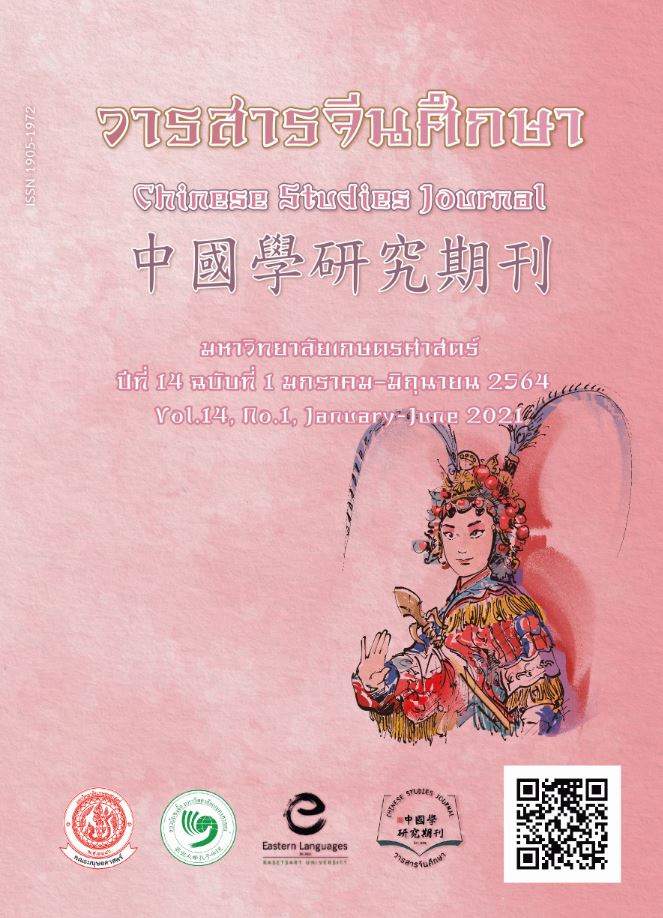The characteristics of "study" words which appear in Chinese proverbs
Main Article Content
Abstract
The purpose of this research paper is to research the characteristics of Chinese proverbs that contain the word “study”. The research begins with the letter of recommendation that the author uses to apply for the scholarship. The author has found that there are many proverbs in the Chinese language that are related to education. The scope of this research is to focus on the proverbs in which appear the words "study" that consist of 4 letters by without analyzing grammatical structures and the meaning in Thai is to be the composition only. The presentations are in a tabular form and are arranged in Pinyin order according to the Ministry of Education of the People's Republic of China (1958). The first row is arranged in Pinyin and Chinese proverbs and the second row is the meaning in Thai. On the other hand, because the topic uses the word “study” which would be เรียน (rian) for basically, but for some proverbs the author need to use ศึกษา (sueksa) or ศึกษาเล่าเรียน (sueksalaorian) words in order to express the appropriate meaning in Thai language. After this research it was found that there were three main contexts as follows:
- Characteristics of Chinese proverbs that appear the word “study” in the context that involved with learner.
- Characteristics of Chinese proverbs that appear the word “study” in the context of learning and teaching.
- Characteristics of Chinese proverbs that appear the word “study” in other contexts that do not directly relate to the learner or learning and teaching.
In the summary the author sincerely hopes that it will benefit Chinese language learner in the future.
Article Details
ผลงานทางวิชาการที่ลงตีพิมพ์ในวารสารจีนศึกษา มหาวิทยาลัยเกษตรศาสตร์ เป็นลิขสิทธิ์ของผู้เขียนหรือผู้แปลผลงานนั้น หากนำลงในวารสารจีนศึกษาเป็นครั้งแรก เจ้าของผลงานสามารถนำไปตีพิมพ์ซ้ำในวารสารหรือหนังสืออื่นได้โดยมิต้องแจ้งให้ทราบล่วงหน้า แต่หากผลงานที่ได้รับพิจารณานำลงในวารสารจีนศึกษา เป็นผลงานที่เคยตีพิมพ์ที่อื่นมาก่อนเจ้าของผลงานต้องจัดการเรื่องปัญหาลิขสิทธิ์กับแหล่งพิมพ์แรกเอง หากเกิดปัญหาทางกฎหมาย ถือว่าไม่อยู่ในความรับผิดชอบของวารสารจีนศึกษา มหาวิทยาลัยเกษตรศาสตร์ ทั้งนี้ ความคิดเห็นต่างๆ ในบทความเป็นความคิดเห็นส่วนตัวของผู้เขียน ไม่เกี่ยวกับกองบรรณาธิการวารสารจีนศึกษา มหาวิทยาลัยเกษตรศาสตร์
References
ฐิตาพร จบสัญจร. (2559). ระบบการศึกษาของจีนอดีต ปัจจุบัน อนาคต. กรุงเทพฯ : มูลนิธิสถาบันสร้างสรรค์ปัญญาสาธารณะ.
เผย์ เสี่ยวรุ่ย. (2549). พจนานุกรมจีน-ไทย. พิมพ์ครั้งที่5. กรุงเทพฯ : ทฤษฎี.
พิมพ์พรรณ เทพสุเมธานนท์ นวลละออ แสงสุข และผ่องพรรณ สิทธิชัย. (2559). ปรัชญาการศึกษาเบื้องต้น. กรุงเทพมหานคร : มหาวิทยาลัยรามคำแหง.
วิจิตรมาตรา, ขุน (สง่า กาญจนาคพันธุ์). (2538). สำนวนไทย. กรุงเทพฯ : สมาคมส่งเสริมเทคโนโลยี (ไทย-ญี่ปุ่น).
เสาวภาคย์ วรลัคนากุล. (2551). สุภาษิตจีน. กรุงเทพฯ : สำนักพิมพ์มหาวิทยาลัยรามคำแหง.
เสถียร โพธินันทะ. (2506). เมธีตะวันออก. พระนคร : มูลนิธิก.ศ.ม.
อาริสา หาวรดิษ. (2560). เปรียบเทียบคำสุภาษิตไทยที่ใช้คำเกี่ยวกับสัตว์แต่ในสุภาษิตจีน ไม่ปรากฏคำเกี่ยวกับสัตว์ แต่ความหมายของทั้งสองภาษาคล้ายคลึงกัน. กรุงเทพมหานคร : มหาวิทยาลัยธุรกิจบัณฑิตย์.
The Contemporary Chinese Dictionary. (2015). Beijing : The Commercial Press.
Ministry of Education of the People's Republic of China. (1958). Chinese Phonetic System.


